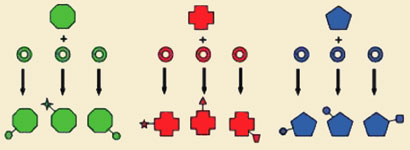Field of Science
-
-
Change of address7 months ago in Variety of Life
-
Change of address7 months ago in Catalogue of Organisms
-
-
Earth Day: Pogo and our responsibility9 months ago in Doc Madhattan
-
What I Read 202410 months ago in Angry by Choice
-
I've moved to Substack. Come join me there.1 year ago in Genomics, Medicine, and Pseudoscience
-
-
-
-
Histological Evidence of Trauma in Dicynodont Tusks7 years ago in Chinleana
-
Why doesn't all the GTA get taken up?7 years ago in RRResearch
-
-
Harnessing innate immunity to cure HIV9 years ago in Rule of 6ix
-
What kind of woman would pray for health or use spiritual healing?9 years ago in Epiphenom
-
-
-
-
-
-
post doc job opportunity on ribosome biochemistry!11 years ago in Protein Evolution and Other Musings
-
-
Blogging Microbes- Communicating Microbiology to Netizens11 years ago in Memoirs of a Defective Brain
-
Re-Blog: June Was 6th Warmest Globally11 years ago in The View from a Microbiologist
-
-
-
The Lure of the Obscure? Guest Post by Frank Stahl13 years ago in Sex, Genes & Evolution
-
-
Lab Rat Moving House14 years ago in Life of a Lab Rat
-
Goodbye FoS, thanks for all the laughs14 years ago in Disease Prone
-
-
Slideshow of NASA's Stardust-NExT Mission Comet Tempel 1 Flyby14 years ago in The Large Picture Blog
-
in The Biology Files
Smuggling key factor in China's rare earth actions
Widespread smuggling of rare earth materials and rapidly increasing domestic demands are key factors in China's recent moves to drastically reduce exports of the sought after elements.In July, China, currently in control of almost the entire global rare earths market, announced a reduction of up to 72 per cent in its exports for the second half of 2010 compared to the same period last year. Despite its position as the world's major producer of rare earth elements, as the materials bleed out from the country, China has attempted to acquire other mines around the globe to maintain its control of the growing global market... read more.
UK carbon capture competition for £1 billion becomes a one horse race
On the same day UK ministers revealed a £1 billion fund for the development of carbon capture and storage (CCS), power company E.ON UK announced it is pulling out of the government's national CCS competition, leaving just one company in the race. In 2007 the government announced a competition to build one of the world's first commercial scale CCS demonstration plants in a bid to strengthen the UK's position as a world leader in cleaner fossil fuel technology. Before E.ON's departure from the race, energy firms BP and Peel Power had already pulled out of the competition in 2008 and 2009 respectively... read more.
Kroto suggests an alternative to peer review
My fellow blogger, wavefunction, in his latest post raised an important issue in science: peer-review. He quotes Sir Kroto in his interview in Nature where he suggests that a new system should be put in place instead of 'the most ludicrous ever devised' that will allow money to be awarded by local institutions not the government bodies. The money should be given in three categories:
- Young deserved researchers
- Researcher whose most recent report was excellent
- Researcher who could not be funded in (2) should be allowed to raise matching funding from industries.
Although Kroto must have given a lot of thought to this before suggesting it, I can see many problems with this system:
Who decides who is a 'deserved' young researcher or who had an 'excellent' report and who did not? That would be your peers too, right? Just that they would be peers from the same local institution instead of peers from world over in your own subject area who would have been in a better position to judge your research in the first place.
How will the government decide how much money to be given to each local institution? If every institution is given equal money would that not be unfair on 'better performing' institutions?
Getting rid of proposals? I thought writing proposals was a very important time in a researcher's career not just because the proposal will give him money to continue his research but also it is that time when the researcher thinks the hardest about his work. He thinks about it not only from the perspective advancing knowledge about the subject area but also how his research plays a role in a wider picture of science and society.
The current peer-review system has problems and we acknowledge that. With all due respect to Kroto, this new system needs to be put forth in a more formal manner and needs to address the issues above for the wider scientific community to take seriously.
Who decides who is a 'deserved' young researcher or who had an 'excellent' report and who did not? That would be your peers too, right? Just that they would be peers from the same local institution instead of peers from world over in your own subject area who would have been in a better position to judge your research in the first place.
How will the government decide how much money to be given to each local institution? If every institution is given equal money would that not be unfair on 'better performing' institutions?
Getting rid of proposals? I thought writing proposals was a very important time in a researcher's career not just because the proposal will give him money to continue his research but also it is that time when the researcher thinks the hardest about his work. He thinks about it not only from the perspective advancing knowledge about the subject area but also how his research plays a role in a wider picture of science and society.
The current peer-review system has problems and we acknowledge that. With all due respect to Kroto, this new system needs to be put forth in a more formal manner and needs to address the issues above for the wider scientific community to take seriously.
Mining soil DNA for molecular decorators
 |
| Enzymes (rings) found in eDNA libraries can modify glycopeptides cores (top) in new ways |
Banik, J., Craig, J., Calle, P., & Brady, S. (2010). Tailoring Enzyme-Rich Environmental DNA Clones: A Source of Enzymes for Generating Libraries of Unnatural Natural Products Journal of the American Chemical Society DOI: 10.1021/ja105825a
Britain should take lessons from USA
 |
| Skilled workers may be queuing up to enter the UK, but only a fraction will be allowed in |
In June the government announced a temporary cap on the number of skilled workers from non-EU states that can enter Britain. The move prompted concern in the scientific community that it would lose access to a rich pool of international talent and potentially jeopardise the UK's ability to remain at the forefront of global research.
Before this annual limit is made permanent in April next year, the government could learn lessons from other scientifically advanced nations - also aware of the need to control migration - who have made exceptions for researchers in their immigration policies... read more.
Chemistry that can change the world
After the Economist questioned the value of chemistry last week, today I read with keen interest seeking chemistry in the special article in New Scientist titled ‘50 ideas to change science forever’. Although they have only released 25 ideas in the current issue, I could find at least 10 ideas which were either all chemistry or had a heavy connection to chemistry.
Here's my list....read more.
Here's my list....read more.
Can academic pursuits and money not go hand-in-hand?
This month’s C & EN editorial by Allen J. Bard argues that ‘the culture of academic research has shifted over the past 50 years from research evaluation based on teaching, creativity and productivity to one based simply on the amount of money raised.’
Allen goes on to note that ‘I’ve been to party to tenure discussions that have centred on “scoring two major grants” rather than on the quality of work.’ What is more worrying is that, ‘the fact is that the final decision to fund really comes from the project officers who have often become remote from the frontiers of research and often fall prey to the fad of the mouth’.
He also points out that this has led the universities to focus on demonstrating the ‘economical value’ of the research and their ‘critical mission’ becomes getting more intellectual property (IP) or start-up companies. He concludes by saying, ‘If working closely with students and doing long-term fundamental research is not the goal and money is the important thing, there are more lucrative professions than academic ones for them to pursue.’
If it is true that academics spend 70% of their time writing research proposals then I do agree that Allen has raised some very valid points. But I can’t seem to agree with him that academics should be a pursuit devoid of money.
I think if it’s possible to be an academic who is good at commercialising ideas then one should be. All those monetary benefits of IP that come along with it are a good thing for a university, especially in the economic climate that we are in, where we face major cuts to research spending and increased tuition fees.
Also blaming this capitalistic view of a university for not being able to attract the right talent isn’t right. Academics tend to believe that all the people who do research do it because of the love of the subject and nothing else. Well, they might, but more often than not they may have other reasons. In that respect, the fact that an academic pursuit can lead to a good commercial idea, may actually lure more people than just the subject nerds.
And yet, I cannot agree more that it shouldn’t become the ‘critical mission’ of a university. It may have happened that universities started small, trying to align with the capitalistic nature of the market, by asking academics to ‘think about’ commercialising ideas and over the years reached the point, that they have now, where it has become their ‘main aim’.
How did our nitrogen cycle evolve?
In trying to feed our growing population, we now add twice as much nitrogen to the soil (after chemically ‘fixing’ it to make fertilisers) as microbes fix from the atmosphere. Human activity has skewed the balance in the earth’s nitrogen cycle. But how did the modern nitrogen cycle evolve? A recent review published in Science tries to answer that question and make suggestions about the future. ...read more.

Canfield, D., Glazer, A., & Falkowski, P. (2010). The Evolution and Future of Earth's Nitrogen Cycle Science, 330 (6001), 192-196 DOI: 10.1126/science.1186120
Canfield, D., Glazer, A., & Falkowski, P. (2010). The Evolution and Future of Earth's Nitrogen Cycle Science, 330 (6001), 192-196 DOI: 10.1126/science.1186120
India calls for ambitious increase in science funding
The Scientific Advisory Council to the Prime Minister of India has advised the government to increase its science funding from less than 1 per cent of GDP to up to 2.5 per cent by 2020. It has also recommended overhauling the management of science in the country to increase innovation in the research community.
India is becoming an economic power but without scientific leadership this growth might be unsustainable, says distinguished materials chemist CNR Rao, chairman of the Science Advisory Council. 'This report has been outlined to bring change to the scientific management system and make India a leader in science', he adds... read more.
India is becoming an economic power but without scientific leadership this growth might be unsustainable, says distinguished materials chemist CNR Rao, chairman of the Science Advisory Council. 'This report has been outlined to bring change to the scientific management system and make India a leader in science', he adds... read more.
Sleep more to lose weight? Read this before
Before this piece of research gets out of hand due to shoddy science journalism, it does not conclude that people should sleep longer to lose weight. The paper is titled "Insufficient sleep undermines dietary efforts to reduce adiposity", which means that if you are person dieting to lose fat then sleeping less will undermine your efforts.
The study compares a group of 10 who were dieting, 6 persons slept for 8.5 hours every night for two weeks and similarly, 4 persons slept for 5.5 hours every night for two weeks. And this was repeated on the same subjects after three months. It was seen that the persons who slept less lost less body-fat more fat-free body mass (such as proteins). In the subjects who lost more fat-free body mass they observed increased hunger, which under normal circumstances, will undermine the efforts of a person dieting.
The conclusion is very clear

Nedeltcheva AV, Kilkus JM, Imperial J, Schoeller DA, & Penev PD (2010). Insufficient sleep undermines dietary efforts to reduce adiposity. Annals of internal medicine, 153 (7), 435-41 PMID: 20921542
The study compares a group of 10 who were dieting, 6 persons slept for 8.5 hours every night for two weeks and similarly, 4 persons slept for 5.5 hours every night for two weeks. And this was repeated on the same subjects after three months. It was seen that the persons who slept less lost less body-fat more fat-free body mass (such as proteins). In the subjects who lost more fat-free body mass they observed increased hunger, which under normal circumstances, will undermine the efforts of a person dieting.
The conclusion is very clear
Patients attempting to lose weight should consider getting adequate amounts of sleep in addition to limiting calorie intake to ensure that they retain lean muscle mass and lose fat.The conclusion is NOT what The Seattle Times or Los Angeles Times says:
Moral of the study? Put aside the work, or that late-night TV show, and get some shut-eye. Compared to exercise and diet, it's the easiest part of healthy weight loss.Also remember the limitations of the study
All were nonsmokers aged 35 to 49 years, and none were morbidly obese. Patients were followed for only 2 periods of 2 weeks each, much less than the average amount of time people would usually spend on a calorie-restriction program
Nedeltcheva AV, Kilkus JM, Imperial J, Schoeller DA, & Penev PD (2010). Insufficient sleep undermines dietary efforts to reduce adiposity. Annals of internal medicine, 153 (7), 435-41 PMID: 20921542
Have we solved all the questions in chemistry?
If the polymath Charles Babbage was alive, I don’t think he would have said this: ‘With completion of the periodic table, though, and with modern understanding of chemical bonds as quantum phenomena caused by the pairing of electrons of opposite spins, chemistry as an intellectual discipline looks, to the outsider at least, to have been largely solved.’ But the Babbage from the Economist certainly seems to think so.
Err…I beg to differ and so will the millions of chemist who do research...read more.
Why I should be made the Chief Editor of Chemistry World
The celebration of science occurs annually with the announcement of the Nobel prizes. This is the time when science gets a lot of media coverage and scientists who have made a great impact on human lives are given their due recognition. At about the same time there is also a celebration of geeky humour that happens annually. It’s when the Annals of Improbable Research holds a party at Harvard University where real Nobel prize winners award the Ig Nobel prizes. These prizes are given to discoveries or inventions “that cannot, or should not, be reproduced”...read more
Subscribe to:
Comments (Atom)

























